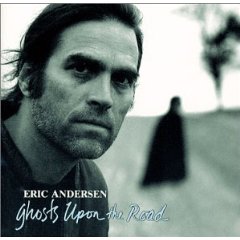Eric Andersen, The Tin Angel, Philadelphia, March 1999
Some concerts I remember only who went with me. Some concerts I forget because of who went with me. This show was neither, simply a moving performance I saw with some friends from grad school who are more or less out of my life, though not in any kind of sad way.
 I discovered Eric Andersen by luck, browsing the central public library in downtown Cincinnati, summer of 1993, its reading areas dominated by stale, old, sleeping men. I saw this unfamiliar CD in the folk section, the album cover an arresting image of this grim, gaunt man, his face haunted, his eyes dark pools of regret. I took the CD home with me, and I didn’t immediately fall in love with Ghosts on the Road, not at first, but something about the songs compelled me to listen again, and again. The first track that finally pulled me in was “Belgian Bar,” a song that I suddenly realize has influenced my own travel writings, recalling those chance encounters, moments talking to a stranger, that linger in our memories, wisps of magic never fully realized.
I discovered Eric Andersen by luck, browsing the central public library in downtown Cincinnati, summer of 1993, its reading areas dominated by stale, old, sleeping men. I saw this unfamiliar CD in the folk section, the album cover an arresting image of this grim, gaunt man, his face haunted, his eyes dark pools of regret. I took the CD home with me, and I didn’t immediately fall in love with Ghosts on the Road, not at first, but something about the songs compelled me to listen again, and again. The first track that finally pulled me in was “Belgian Bar,” a song that I suddenly realize has influenced my own travel writings, recalling those chance encounters, moments talking to a stranger, that linger in our memories, wisps of magic never fully realized.
Soon I was in captivated by another song on the album, “Irish Lace,” one of the saddest songs I’ll ever know. Andersen’s mournful liner notes describe “Irish Lace” as about two women. One lives not too far away and though she is still around you could say she has gone. The other has long departed this world but I couldn’t say she’s ever left.
I don’t remember if Andersen performed either of these songs that night in 1999, but it didn’t matter. The concert was splendid, full of Andersen’s reminisceces of Philly in the sixties and other American singers — Phil Ochs, Tom Paxton, Bobby Dylan, Townes Van Zandt — on the vanguard of the progressive folk scene. But even with these stories, the concert was not about seeing a relic, but a troubadour who’s seen something of it all. Live, Eric Andersen was more lanky than gaunt, with a touching sense of humor that betrayed none of the melancholy that first drew me to him.
Eighteen months later I was to see Andersen again, but by then, everything had changed.